人教版(2019) 必修 第一册Unit2Travellin gAround Discovering useful structures课件(共20张PPT)
文档属性
| 名称 | 人教版(2019) 必修 第一册Unit2Travellin gAround Discovering useful structures课件(共20张PPT) | 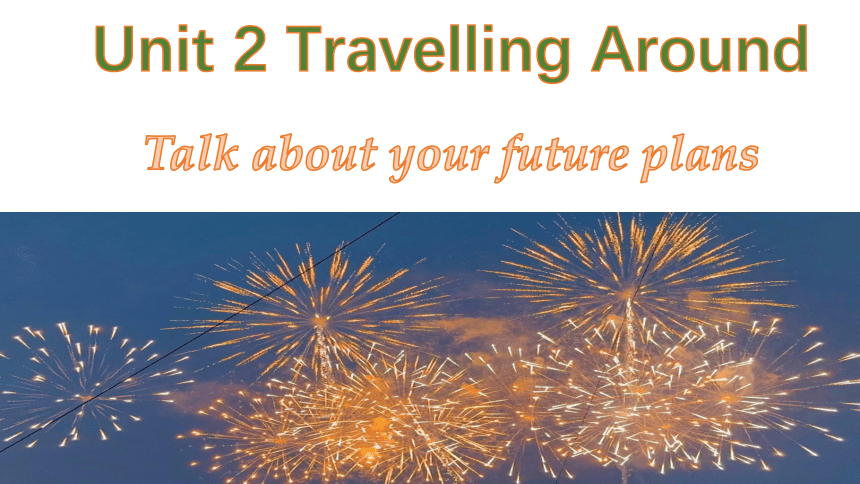 | |
| 格式 | pptx | ||
| 文件大小 | 5.7MB | ||
| 资源类型 | 教案 | ||
| 版本资源 | 人教版(2019) | ||
| 科目 | 英语 | ||
| 更新时间 | 2024-09-08 17:51:39 | ||
图片预览

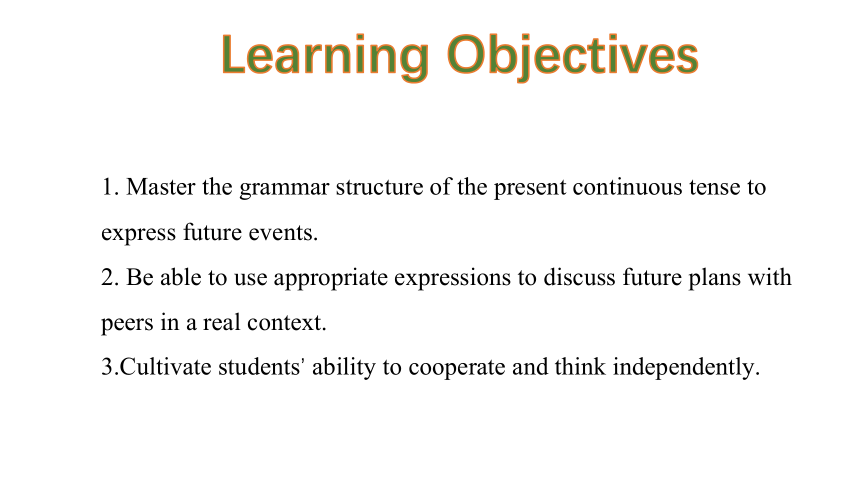
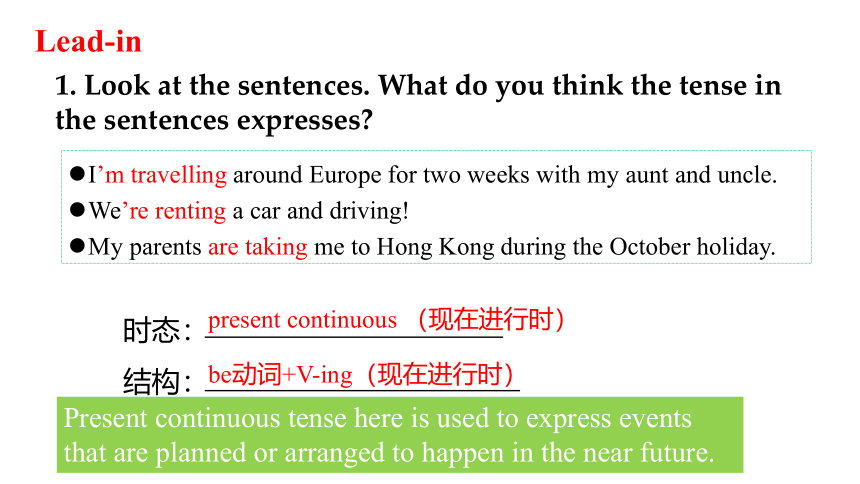
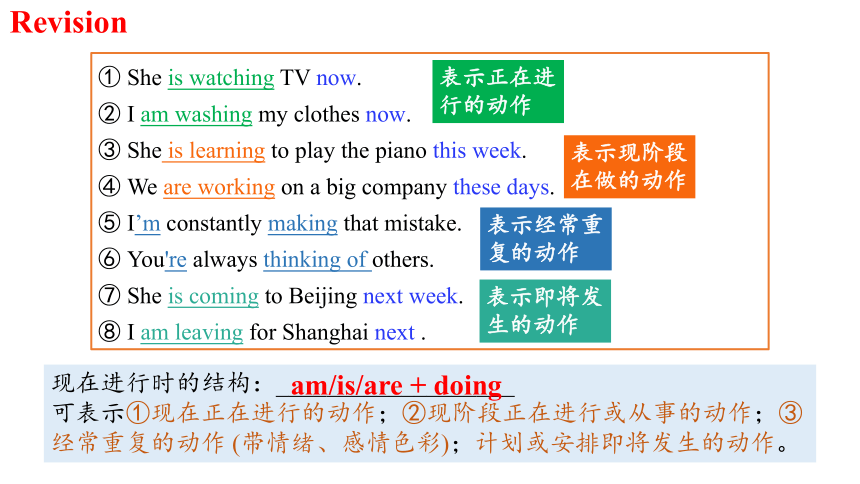
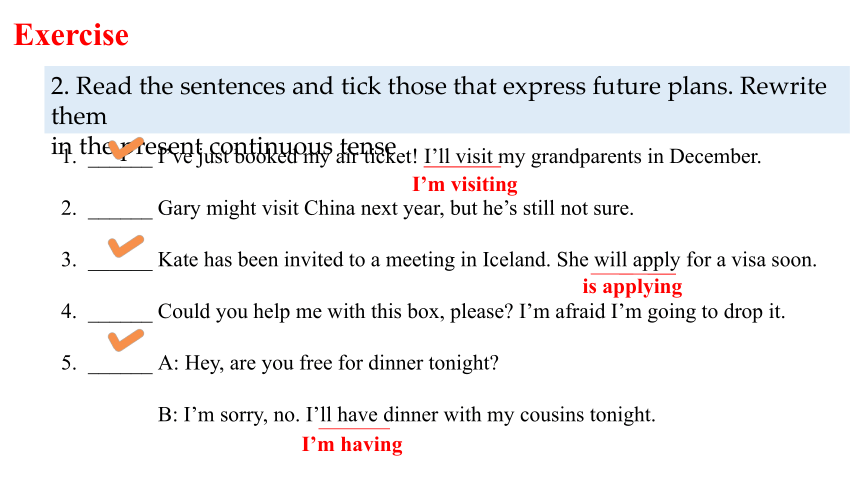
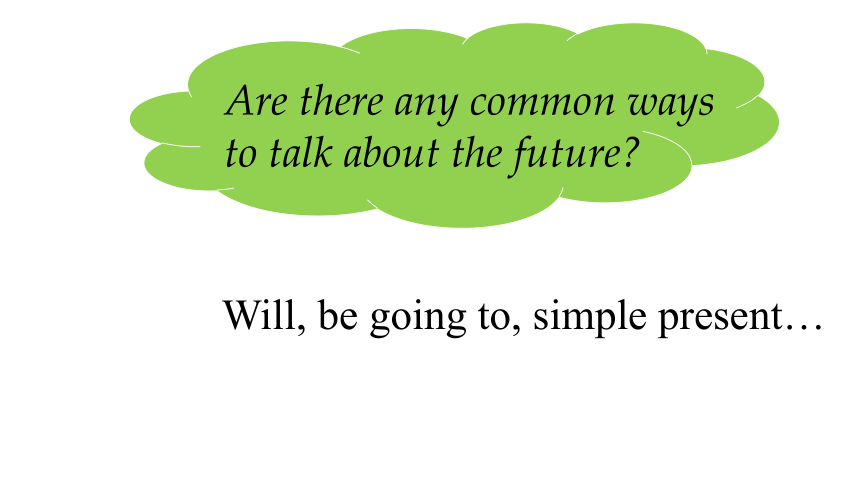
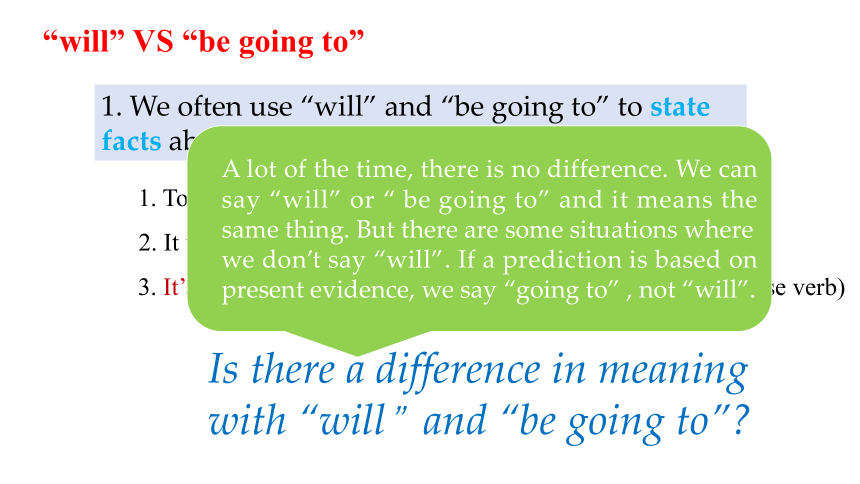
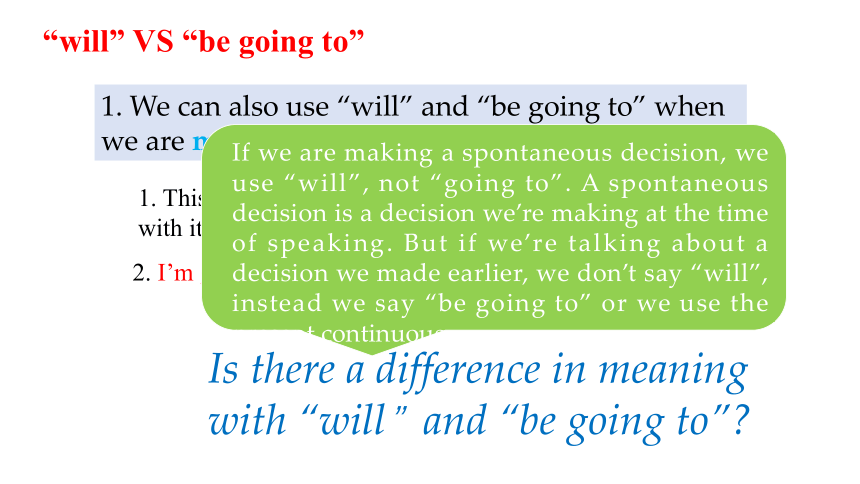
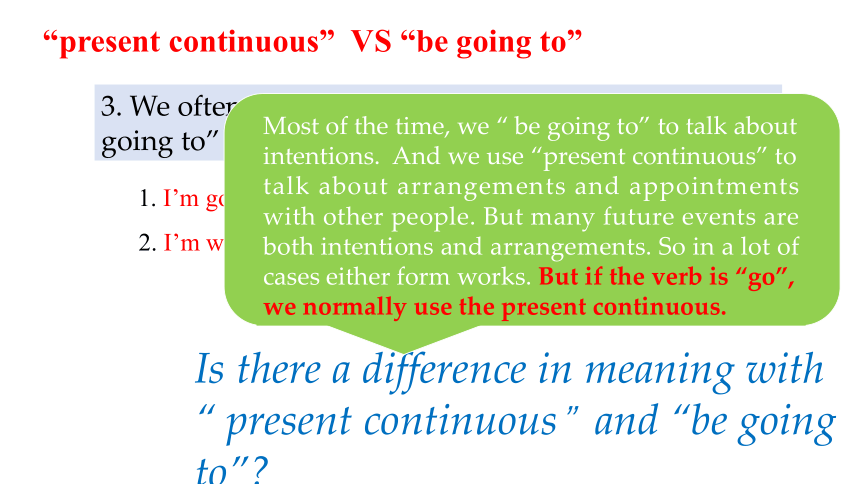
文档简介
(共20张PPT)
Unit 2 Travelling Around
Talk about your future plans
Learning Objectives
1. Master the grammar structure of the present continuous tense to express future events.
2. Be able to use appropriate expressions to discuss future plans with peers in a real context.
3.Cultivate students’ ability to cooperate and think independently.
Lead-in
1. Look at the sentences. What do you think the tense in the sentences expresses
I’m travelling around Europe for two weeks with my aunt and uncle.
We’re renting a car and driving!
My parents are taking me to Hong Kong during the October holiday.
时态:
结构:
be动词+V-ing(现在进行时)
present continuous (现在进行时)
Present continuous tense here is used to express events that are planned or arranged to happen in the near future.
① She is watching TV now.
② I am washing my clothes now.
③ She is learning to play the piano this week.
④ We are working on a big company these days.
⑤ I’m constantly making that mistake.
⑥ You're always thinking of others.
⑦ She is coming to Beijing next week.
⑧ I am leaving for Shanghai next .
表示正在进行的动作
表示现阶段在做的动作
表示即将发生的动作
现在进行时的结构:___________________
可表示①现在正在进行的动作;②现阶段正在进行或从事的动作;③经常重复的动作 (带情绪、感彩);计划或安排即将发生的动作。
am/is/are + doing
表示经常重复的动作
Revision
2. Read the sentences and tick those that express future plans. Rewrite them
in the present continuous tense
1. ______ I’ve just booked my air ticket! I’ll visit my grandparents in December.
2. ______ Gary might visit China next year, but he’s still not sure.
3. ______ Kate has been invited to a meeting in Iceland. She will apply for a visa soon.
4. ______ Could you help me with this box, please I’m afraid I’m going to drop it.
5. ______ A: Hey, are you free for dinner tonight
B: I’m sorry, no. I’ll have dinner with my cousins tonight.
I’m visiting
is applying
I’m having
Exercise
Are there any common ways to talk about the future
Will, be going to, simple present…
1. We often use “will” and “be going to” to state facts about the future and make predictions.
1. Tomorrow will be sunny. (will + base verb)
2. It won’t cost you a penny. (won’t + base verb)
“will” VS “be going to”
3. It’s going to rain. Look at the dark clouds! (be going to + base verb)
Is there a difference in meaning with “will” and “be going to”
A lot of the time, there is no difference. We can say “will” or “ be going to” and it means the same thing. But there are some situations where we don’t say “will”. If a prediction is based on present evidence, we say “going to” , not “will”.
1. We can also use “will” and “be going to” when we are making decisions.
1. This suitcase is so heavy. Could you help me with it ——No problem, I’ll do it.
“will” VS “be going to”
2. I’m going to tell the truth about the broken vase.
Is there a difference in meaning with “will” and “be going to”
If we are making a spontaneous decision, we use “will”, not “going to”. A spontaneous decision is a decision we’re making at the time of speaking. But if we’re talking about a decision we made earlier, we don’t say “will”, instead we say “be going to” or we use the present continuous.
3. We often use “present continuous tense” and “be going to” to talk about future plans.
1. I’m going to walk to the interview. (be going to + base verb)
2. I’m walking to the interview. (be +v-ing)
“present continuous” VS “be going to”
Is there a difference in meaning with “ present continuous” and “be going to”
Most of the time, we “ be going to” to talk about intentions. And we use “present continuous” to talk about arrangements and appointments with other people. But many future events are both intentions and arrangements. So in a lot of cases either form works. But if the verb is “go”, we normally use the present continuous.
4. We also use “simple present tense” to talk about routines in the future.
1. The last train leaves at 6 pm today.
2. The restaurants opens at 8 am.
simple present
Is there any special rules when using “simple present tense” to express future events
We can use “simple present” when we talk about routines in the future, usually a scheduled event, something that is scheduled to happen in the future. It usually has something to do with transportation, TV shows, the opening and closing of restaurants, etc.
Let’s do a quiz!
Total Questions: 10
Time for each question:
10 seconds
Wish you all the best!
Choose the correct sentence:
A. In 2050, I am working.
B. In 2050, I will be working.
C. In 2050, I work.
We use "will" for the far future.
2. Choose the best answer to the following question:
What are you doing this weekend
I’m studying
I study
I will study
We use the present continuous for very close future.
Sam: Look at those dark clouds in the sky.
Jim: .
A. It will rain.
B. It is going to rain.
C. It rains.
We have evidence of rain(dark clouds). We use “going to” to make a prediction based on evidence.
2. Which of the following is the best to use in this situation.
The bus at 8 pm.
will depart
is going to depart
is departing
departs
Though all the answers are possible, we generally use the simple present for very close future scheduled events.
5. For my New Year’s resolution, I promise I .
A. not drinking
B. won’t drink
C. am not drinking
D. am not drink
For promises we use “will” and “won’t.
6. Jane: I’m so tired.
Ben: Don’t worry, I .
I am doing the dishes
I do the dishes
I will do the dishes
We use “will” when we offer/volunteer to do something.
7. Choose the correct sentence:
What are you doing tomorrow
A. I’m go to Julie Dorion concert
B. I going to Anamai concert
C. I will going to a Smasing Pumpkins concert
D. I’m going to a Tori Amos concert
8. Choose the best answer:
What is Franco doing this Sunday
He is going to Chile
He go to Chile
He will go to Chile
He goes to Chile
We use “be going to” to express things we intend to do.
9. In 150 years, zombies the world.
A. taking over
B. will take over
C. take over
D. are taking over
2. Choose the best answer:
The store at 10 am tomorrow.
will open
opens
We use "will" for possible predictions about the far future.
We use “simple present" for routines that are scheduled to happen in the near future.
Let’s talk!
3. Discuss weekend plans with a partner, based on the weather report below.
Example:
A: What are you doing on Saturday morning
B: Well, it's going to be sunny in the morning and not very windy, so I'm having a picnic with my friends.
It’s being sunny
Possible Version:
Daisy: Hello, Judy! What are you doing on Saturday afternoon
Judy: Hi, Daisy! I am going to climb Mount Xishan on Saturday. Do you want to join me
Daisy: How about the weather
Judy: It’s going to be sunny with a light wind in the afternoon. Perfect weather for mountain climbing.
Daisy: Well, that sounds great. When and where should we meet
Judy: 3 p.m. at the foot of the Mount Xishan, is that convenient for you
Daisy: That works for me. How about dinner
Possible Version:
——Are you bringing your own food or something
Judy: Yeah, I suppose so. The food at the restaurant is really expensive.
Daisy: What do we do in the evening
Judy: I haven’t given it a thought yet. Any ideas in your mind
Judy: It’s going to be very windy in the evening. Outdoor activities are out of option. How about going to the cinema There are several newly-released comedies.
Daisy: Brilliant. See you then.
Judy: See you.
Thank You
Unit 2 Travelling Around
Talk about your future plans
Learning Objectives
1. Master the grammar structure of the present continuous tense to express future events.
2. Be able to use appropriate expressions to discuss future plans with peers in a real context.
3.Cultivate students’ ability to cooperate and think independently.
Lead-in
1. Look at the sentences. What do you think the tense in the sentences expresses
I’m travelling around Europe for two weeks with my aunt and uncle.
We’re renting a car and driving!
My parents are taking me to Hong Kong during the October holiday.
时态:
结构:
be动词+V-ing(现在进行时)
present continuous (现在进行时)
Present continuous tense here is used to express events that are planned or arranged to happen in the near future.
① She is watching TV now.
② I am washing my clothes now.
③ She is learning to play the piano this week.
④ We are working on a big company these days.
⑤ I’m constantly making that mistake.
⑥ You're always thinking of others.
⑦ She is coming to Beijing next week.
⑧ I am leaving for Shanghai next .
表示正在进行的动作
表示现阶段在做的动作
表示即将发生的动作
现在进行时的结构:___________________
可表示①现在正在进行的动作;②现阶段正在进行或从事的动作;③经常重复的动作 (带情绪、感彩);计划或安排即将发生的动作。
am/is/are + doing
表示经常重复的动作
Revision
2. Read the sentences and tick those that express future plans. Rewrite them
in the present continuous tense
1. ______ I’ve just booked my air ticket! I’ll visit my grandparents in December.
2. ______ Gary might visit China next year, but he’s still not sure.
3. ______ Kate has been invited to a meeting in Iceland. She will apply for a visa soon.
4. ______ Could you help me with this box, please I’m afraid I’m going to drop it.
5. ______ A: Hey, are you free for dinner tonight
B: I’m sorry, no. I’ll have dinner with my cousins tonight.
I’m visiting
is applying
I’m having
Exercise
Are there any common ways to talk about the future
Will, be going to, simple present…
1. We often use “will” and “be going to” to state facts about the future and make predictions.
1. Tomorrow will be sunny. (will + base verb)
2. It won’t cost you a penny. (won’t + base verb)
“will” VS “be going to”
3. It’s going to rain. Look at the dark clouds! (be going to + base verb)
Is there a difference in meaning with “will” and “be going to”
A lot of the time, there is no difference. We can say “will” or “ be going to” and it means the same thing. But there are some situations where we don’t say “will”. If a prediction is based on present evidence, we say “going to” , not “will”.
1. We can also use “will” and “be going to” when we are making decisions.
1. This suitcase is so heavy. Could you help me with it ——No problem, I’ll do it.
“will” VS “be going to”
2. I’m going to tell the truth about the broken vase.
Is there a difference in meaning with “will” and “be going to”
If we are making a spontaneous decision, we use “will”, not “going to”. A spontaneous decision is a decision we’re making at the time of speaking. But if we’re talking about a decision we made earlier, we don’t say “will”, instead we say “be going to” or we use the present continuous.
3. We often use “present continuous tense” and “be going to” to talk about future plans.
1. I’m going to walk to the interview. (be going to + base verb)
2. I’m walking to the interview. (be +v-ing)
“present continuous” VS “be going to”
Is there a difference in meaning with “ present continuous” and “be going to”
Most of the time, we “ be going to” to talk about intentions. And we use “present continuous” to talk about arrangements and appointments with other people. But many future events are both intentions and arrangements. So in a lot of cases either form works. But if the verb is “go”, we normally use the present continuous.
4. We also use “simple present tense” to talk about routines in the future.
1. The last train leaves at 6 pm today.
2. The restaurants opens at 8 am.
simple present
Is there any special rules when using “simple present tense” to express future events
We can use “simple present” when we talk about routines in the future, usually a scheduled event, something that is scheduled to happen in the future. It usually has something to do with transportation, TV shows, the opening and closing of restaurants, etc.
Let’s do a quiz!
Total Questions: 10
Time for each question:
10 seconds
Wish you all the best!
Choose the correct sentence:
A. In 2050, I am working.
B. In 2050, I will be working.
C. In 2050, I work.
We use "will" for the far future.
2. Choose the best answer to the following question:
What are you doing this weekend
I’m studying
I study
I will study
We use the present continuous for very close future.
Sam: Look at those dark clouds in the sky.
Jim: .
A. It will rain.
B. It is going to rain.
C. It rains.
We have evidence of rain(dark clouds). We use “going to” to make a prediction based on evidence.
2. Which of the following is the best to use in this situation.
The bus at 8 pm.
will depart
is going to depart
is departing
departs
Though all the answers are possible, we generally use the simple present for very close future scheduled events.
5. For my New Year’s resolution, I promise I .
A. not drinking
B. won’t drink
C. am not drinking
D. am not drink
For promises we use “will” and “won’t.
6. Jane: I’m so tired.
Ben: Don’t worry, I .
I am doing the dishes
I do the dishes
I will do the dishes
We use “will” when we offer/volunteer to do something.
7. Choose the correct sentence:
What are you doing tomorrow
A. I’m go to Julie Dorion concert
B. I going to Anamai concert
C. I will going to a Smasing Pumpkins concert
D. I’m going to a Tori Amos concert
8. Choose the best answer:
What is Franco doing this Sunday
He is going to Chile
He go to Chile
He will go to Chile
He goes to Chile
We use “be going to” to express things we intend to do.
9. In 150 years, zombies the world.
A. taking over
B. will take over
C. take over
D. are taking over
2. Choose the best answer:
The store at 10 am tomorrow.
will open
opens
We use "will" for possible predictions about the far future.
We use “simple present" for routines that are scheduled to happen in the near future.
Let’s talk!
3. Discuss weekend plans with a partner, based on the weather report below.
Example:
A: What are you doing on Saturday morning
B: Well, it's going to be sunny in the morning and not very windy, so I'm having a picnic with my friends.
It’s being sunny
Possible Version:
Daisy: Hello, Judy! What are you doing on Saturday afternoon
Judy: Hi, Daisy! I am going to climb Mount Xishan on Saturday. Do you want to join me
Daisy: How about the weather
Judy: It’s going to be sunny with a light wind in the afternoon. Perfect weather for mountain climbing.
Daisy: Well, that sounds great. When and where should we meet
Judy: 3 p.m. at the foot of the Mount Xishan, is that convenient for you
Daisy: That works for me. How about dinner
Possible Version:
——Are you bringing your own food or something
Judy: Yeah, I suppose so. The food at the restaurant is really expensive.
Daisy: What do we do in the evening
Judy: I haven’t given it a thought yet. Any ideas in your mind
Judy: It’s going to be very windy in the evening. Outdoor activities are out of option. How about going to the cinema There are several newly-released comedies.
Daisy: Brilliant. See you then.
Judy: See you.
Thank You
